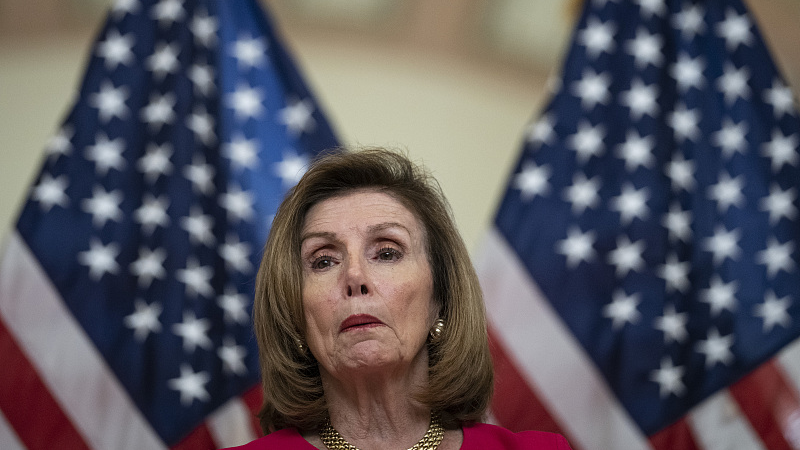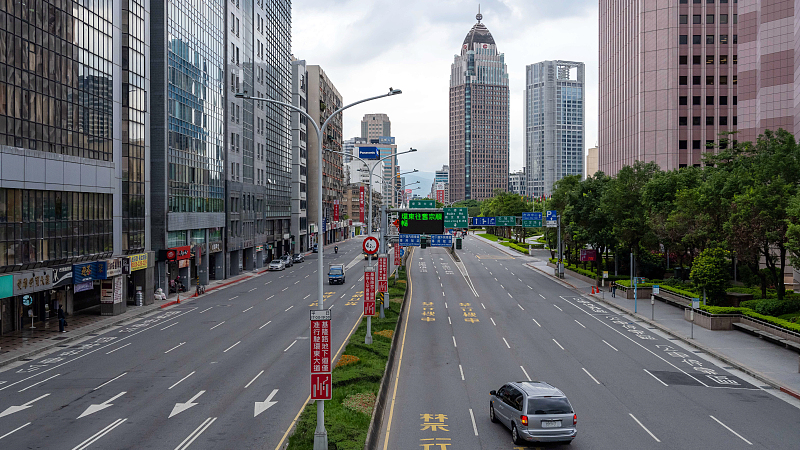
Speaker of the House Nancy Pelosi (D-CA) speaks during a bill enrollment ceremony at the U.S. Capitol in Washington, D.C., August 9, 2022 . /CFP
Speaker of the House Nancy Pelosi (D-CA) speaks during a bill enrollment ceremony at the U.S. Capitol in Washington, D.C., August 9, 2022 . /CFP
Editor's note: Xin Ping is a commentator on international affairs who writes regularly for CGTN, Xinhua, and Global Times. The article reflects the author's opinions and not necessarily the views of CGTN.
Nancy Pelosi has got what she wished for – stealing international spotlight with her visit to China's Taiwan region. But what concerns most people is why would Pelosi poke the hornet's nest and what may come out of this.
The Taiwan question is undoubtedly a major and sensitive issue between the U.S. and China. There is every reason to believe that Pelosi was briefed on the visit's potential repercussions, as U.S. officials who previously clamored for "Taiwan independence" were seriously condemned and sanctioned by China. It is sensible to say that Pelosi's move was neither "strategic" nor "thoughtful," but rather "a reckless jaunt" or "a provocative visit."
The aftermath of the visit is there for all to see. China unsurprisingly made a resolute response, both diplomatically and militarily. But it is neither objective nor truthful to say that tensions only rose after Pelosi visited Taiwan, despite what U.S. officials and some foreign media outlets may wish to depict.
If we look beyond China's military exercises, we could find many interactions that foreshadowed and intensified the antagonism. It is easy to get caught in the narrative trap laid by the U.S. if one focuses solely on China's strong response without taking into account the background and logic behind all the developments.
Most importantly, three questions need to be answered: What does the Taiwan region mean to China? Does Pelosi's visit to Taiwan amount to a breakthrough of the U.S. position on the Taiwan region? And is the U.S. unaware of what the visit means to regional peace and stability?
Taiwan belongs to China – this is a historical and legal fact and an established international consensus. The earliest references so far are found in Seaboard Geographic Gazetteer compiled in the year 230. Ever since the 10th century, then imperial central governments of China had set up administrative bodies to exercise jurisdiction over Penghu and Taiwan. In 1885, Taiwan became the 20th province of China. In 1895, Japan forced the Qing Dynasty to cede Taiwan after Japan's war of aggression against China.
In 1943, the Cairo Declaration clearly stipulated that all the territories Japan had stolen from China, including Taiwan, should be restored to China. The Potsdam Proclamation of 1945 reiterated that "the terms of the Cairo Declaration shall be carried out." Following the defeat of Japan's militarist aggressors in 1945, the Chinese government resumed the exercise of sovereignty over Taiwan, which was succeeded by the People's Republic of China after its founding in 1949.
To any country in the world, sovereignty and territorial integrity are the core interests that cannot be traded away. In this sense, U.S. politicians cannot expect to pull a panda's hair as they see fit without being slapped by the panda's paw, however mild the big mammal has always been.
The U.S. claims to maintain the status quo across the Taiwan Strait, whereas the congressional visit is a violation of the U.S. own commitment. The U.S. has pledged in the three joint communiques with China, the fundamental documents providing for their bilateral relations, that it recognizes there is only one China in the world and that it will only have "unofficial ties" with Taiwan.

A road in Taipei, China's Taiwan, June 3, 2021. /CFP
A road in Taipei, China's Taiwan, June 3, 2021. /CFP
However, at the 50th anniversary of China-U.S. ties, Pelosi, the incumbent House Speaker and third highest-ranking U.S. official, led a delegation to the island on a military aircraft, unequivocally styled her visit as "official," and met with Tsai Ing-wen and other "Taiwan independence" separatist forces of the Democratic Progress Party (DPP).
In her public remarks, Pelosi made the "Taiwan Relations Act" and the "Six Assurances" part of the basis for U.S. "relationship" with Taiwan, despite the fact that those are unilateral moves of the U.S. to fudge and distort the one-China principle. The bipartisan and bicameral composition of the delegation also points to a "slippery slope" of the U.S. backpedaling its one-China commitment and upgrading its substantive interactions with the Taiwan region.
For at least four months ever since rumors about Pelosi's Taiwan visit emerged, China has sent serious warnings to the U.S. through multiple channels and at various levels against taking the unscrupulous move. The U.S. has got the message. It naturally knows how resolutely China would counteract if it supports "Taiwan independence": If some state of the U.S. seeks independence and a foreign country offers it political and even military support like arms sales, the U.S. certainly would not just sit idly by. Unfortunately, the U.S. side went ahead with the provocative visit.
Even a few days before Pelosi announced her Asia trip, the U.S. aircraft carrier combat group moved northward from the Philippine Sea to the waters east to the Bashi Channel. More than 30 U.S. military vessels and three submarines joined the RIMPAC drills in Hawaii. Two HC-130J search and rescue aircrafts, along with multiple KC-135 stratotankers, flew from Anchorage to Okinawa. Over the past year and a half, the U.S. has sold five batches of advanced weapons to Taiwan. Such military buildup by no means brings comfort to the region. This is the way the status quo is changed.
The fracture in China-U.S. relations disrupts the fragile balance that regional countries hope to maintain. Even though regional countries are left with no say or sway over Pelosi's trip to Taiwan, they have publicly expressed their concerns.
ASEAN foreign ministers underlined the importance of refraining from "provocative action" and of "adherence to the principles enshrined in the UN Charter." Malaysia's special envoy for China affairs criticized the practice of interfering in others' internal affairs. Singapore's foreign minister stressed the importance of steady China-U.S. relations.
As expected, Pelosi would not "go gentle into the good night" as her term ends in about three months. The Taiwan visit outraged the 1.4 billion Chinese people, widened the rift and compromised cooperation between the world's two major powers, and disrupted decades of tranquility in the Asia-Pacific. That irresponsible act is what is really "punishing the world."
(If you want to contribute and have specific expertise, please contact us at opinions@cgtn.com. Follow @thouse_opinions on Twitter to discover the latest commentaries in the CGTN Opinion Section.)

